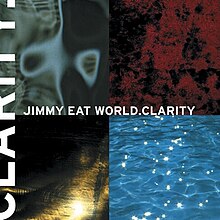Clarity (Jimmy Eat World album)
| Clarity | ||||
|---|---|---|---|---|
 |
||||
| Studio album by Jimmy Eat World | ||||
| Released | February 23, 1999 | |||
| Recorded | 1998–1999 at Sound City and Clear Lake Audio, Los Angeles | |||
| Genre | ||||
| Length | 64:22 | |||
| Label | Capitol | |||
| Producer | Mark Trombino | |||
| Jimmy Eat World chronology | ||||
|
||||
| Singles from Clarity | ||||
|
||||
| Professional ratings | |
|---|---|
| Review scores | |
| Source | Rating |
| AllMusic | |
| Alternative Press | |
| BBC Music | (favorable) |
| Blender | |
| Kerrang! | |
| The New York Times | (favorable) |
| Record Collector | |
| RTÉ Entertainment | |
| Stylus | A |
| Sputnikmusic | (4.5/5) |
| Pitchfork | (3.5/10) |
Clarity is the third studio album by the American rock band Jimmy Eat World, released on February 23, 1999 through Capitol Records. Overlooked upon its release, Clarity has since amassed cult status and critical acclaim, often lauded as one of the best records of the 1990s. Praise centered on its dynamic instrumentation, as well as the heartfelt delivery of singer-guitarist-lyricist Jim Adkins. Various music critics have credited the album for serving as a huge influence on later emo music.
During breaks in touring in support of Static Prevails, Adkins worked at an art store. While working at this store, "Table for Glasses" came about. Adkins learned about shows that featured art pieces from local artists. Adkins was waiting for a friend's piece to begin when he spotted a girl clearing the area with the end of her dress. The girl walked towards "a candle lit table that had already been set up. She just sat there picking out the dirt from her dress", recalls Adkins. "Table for Glasses" was one of a few songs that was intended for "a side project of quiet songs". The project never got beyond jamming, and thus the songs were considered for Clarity. "Lucky Denver Mint" was inspired by a night out in Las Vegas Adkins had with a friend. Adkins was too young to consume alcohol and instead gambled, eventually spending all of his money. As a result, Adkins spent the remainder of the night "walking around feeling lost."
"Your New Aesthetic" was originally a "very mellow" song, but was turned into "a more aggressive, dark rock song", as Lind notes. This version was named "Skeleton" as the guitar sections between the verses "reminded us of horror film music". It featured different lyrics but Adkins thought he could improve upon them and changed the lyrics from the mellow version.
The lyrics for "Goodbye Sky Harbor" were based on the John Irving novel, A Prayer for Owen Meany.
The atmosphere of the Clarity sessions was very encouraging for experimentation. Any idea was explored for some element to make the song better. I would think a song was totally finished and then one of the guys in the band or [producer] Mark [Trombino] would bring up an idea that really closed the deal.
...
Wikipedia
